外研(新标准)版七年级下册Module 3 Making plans Unit 3 Language in use 课件(13张PPT)
文档属性
| 名称 | 外研(新标准)版七年级下册Module 3 Making plans Unit 3 Language in use 课件(13张PPT) |
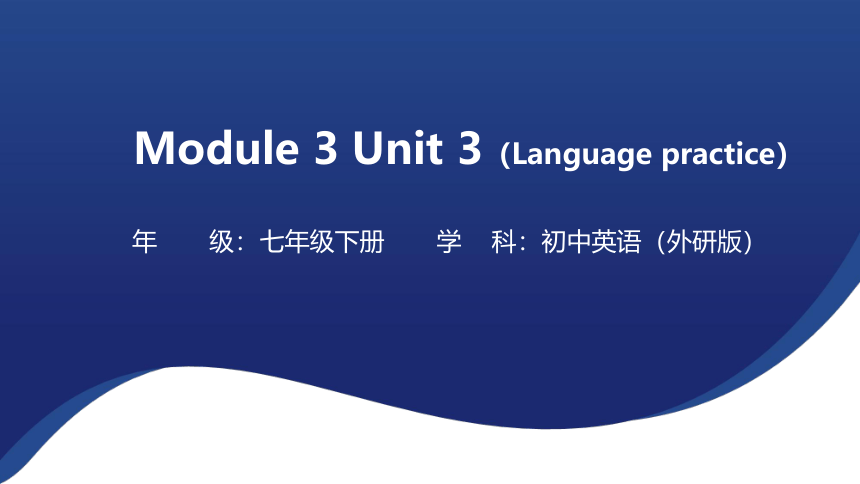
|
|
| 格式 | pptx | ||
| 文件大小 | 1.2MB | ||
| 资源类型 | 教案 | ||
| 版本资源 | 外研版 | ||
| 科目 | 英语 | ||
| 更新时间 | 2024-04-13 00:00:00 | ||
图片预览

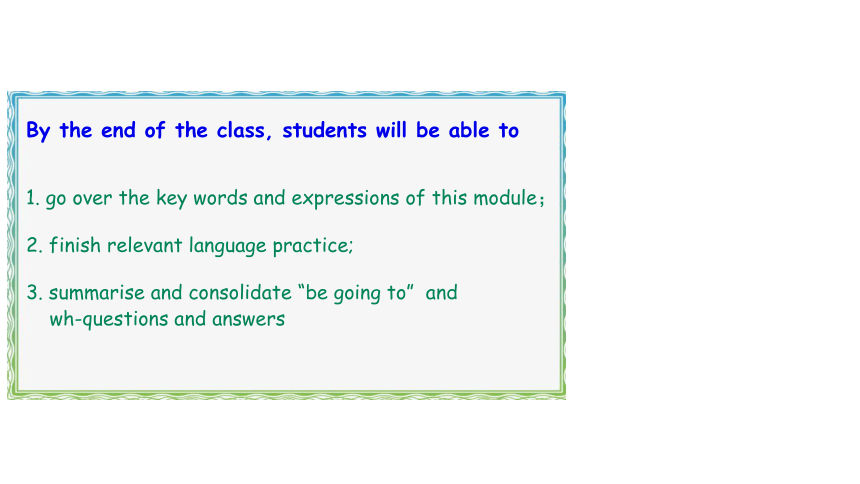
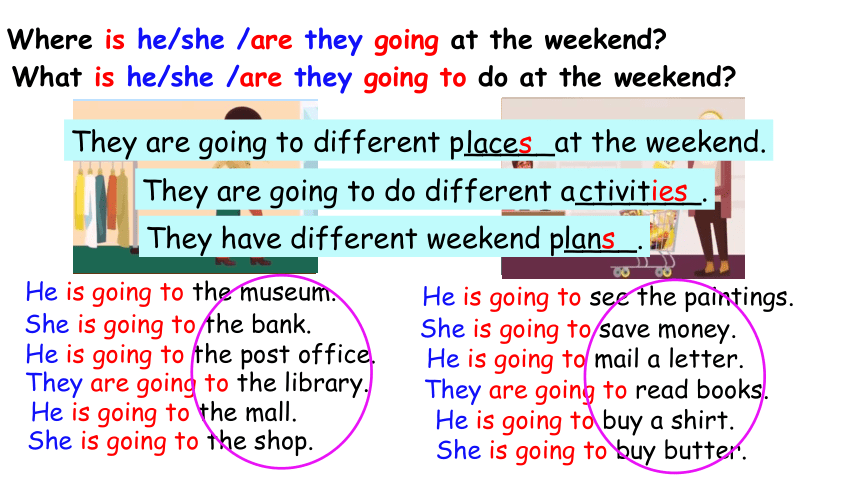
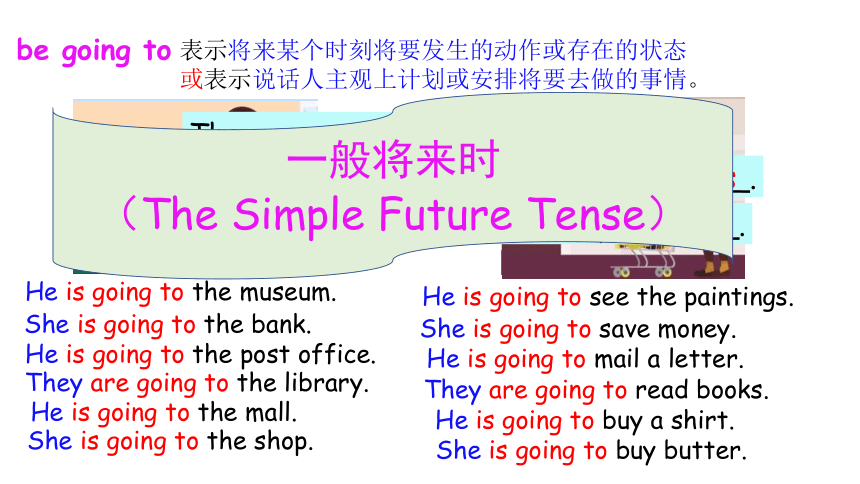
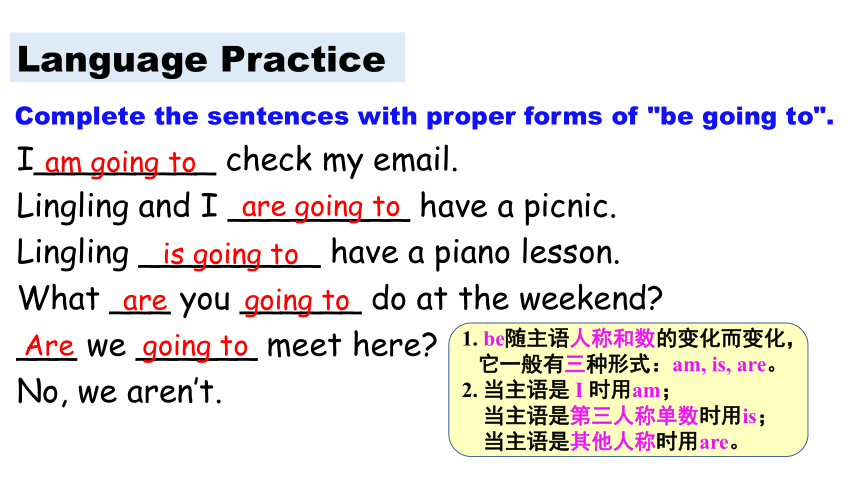
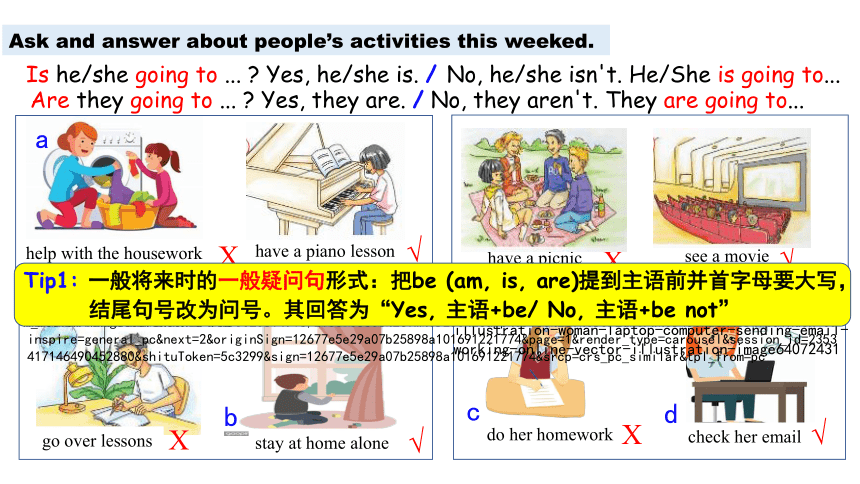
文档简介
(共13张PPT)
Module 3 Unit 3(Language practice)
年 级:七年级下册
学 科:初中英语(外研版)
By the end of the class, students will be able to
1. go over the key words and expressions of this module;
2. finish relevant language practice;
3. summarise and consolidate “be going to” and
wh-questions and answers
Where is he/she /are they going at the weekend
He is going to the museum.
He is going to see the paintings.
She is going to the bank.
She is going to save money.
He is going to the post office.
He is going to mail a letter.
What is he/she /are they going to do at the weekend
They are going to the library.
They are going to read books.
He is going to the mall.
He is going to buy a shirt.
She is going to the shop.
She is going to buy butter.
They are going to different p_____at the weekend.
laces
They are going to do different a_______.
ctivities
They have different weekend p____.
lans
He is going to the museum.
He is going to see the paintings.
She is going to the bank.
She is going to save money.
He is going to the post office.
He is going to mail a letter.
They are going to the library.
They are going to read books.
He is going to the mall.
He is going to buy a shirt.
She is going to the shop.
She is going to buy butter.
They are going to different p_______.
laces
They are going to do different a_______.
ctivities
They have different weekend p_______.
laces
表示将来某个时刻将要发生的动作或存在的状态或表示说话人主观上计划或安排将要去做的事情。
be going to
一般将来时
(The Simple Future Tense)
Language Practice
I_________ check my email.
Lingling and I _________ have a picnic.
Lingling _________ have a piano lesson.
What ___ you ______ do at the weekend
___ we ______ meet here
No, we aren’t.
am going to
are going to
is going to
are going to
Are going to
Complete the sentences with proper forms of "be going to".
1. be随主语人称和数的变化而变化,
它一般有三种形式:am, is, are。
2. 当主语是 I 时用am;
当主语是第三人称单数时用is;
当主语是其他人称时用are。
b
d
c
Is he/she going to ... Yes, he/she is. / No, he/she isn't. He/She is going to...
Are they going to ... Yes, they are. / No, they aren't. They are going to...
√
X
√
X
help with the housework
have a piano lesson
have a picnic
see a movie
go over lessons
stay at home alone
√
X
do her homework
check her email
X
√
Ask and answer about people’s activities this weeked.
a
图片b来源:
https://www./design/353232254 utm_source=baidu&utm_medium=imagesearch&chid=902
图片c来源:https://www./a/339954900_120144338
图片d来源:https://www./stock-illustration-woman-laptop-computer-sending-email-working-online-vector-illustration-image64072431
图片a来源:https://graph./pcpage/similar carousel=503&entrance=GENERAL&extUiData%5BisLogoShow%5D=1&image=http%3A%2F%2Fmms1.%2Fit%2Fu%3D3023814918,2158705608%26fm%3D253%26app%3D138%26f%3DJPEG%3Fw%3D450%26h%3D470&index=0&inspire=general_pc&next=2&originSign=12677e5e29a07b25898a101691221774&page=1&render_type=carousel&session_id=2353417146490452880&shituToken=5c3299&sign=12677e5e29a07b25898a101691221774&srcp=crs_pc_similar&tpl_from=pc
Tip1: 一般将来时的一般疑问句形式:把be (am, is, are)提到主语前并首字母要大写,
结尾句号改为问号。其回答为“Yes, 主语+be/ No, 主语+be not”
Now complete the answers to the questions. Use short forms.
1.Yes, I ______.
2.Yes, they _____.
3._______, she isn’t.
4. No, we ________.
5.Yes, he _______.
check /you /going /are /to /email /your /
they /on /in /park /are /going /to /Sunday / litter / collect /the /
some /going /is /new /buy /Betty/to / clothes/
this/ a /you /see /going /are / to /movie /evening/
computer/ Tony / to /play /a /is /going /game/
Are you going to check your email
Are they going to collect litter in the park on Sunday
Is Betty going to buy some new clothes
Are you going to see a movie this evening
Is Tony going to play a computer game
3. Put the words in the correct order
to make questions.
am
are
No
aren’t
is
5. Daming __________________ ( not stay) in bed on Sunday morning.
He_______________ (get) up early.
We ________________ (see) a movie at the weekend.
2. I ________________ (have) a piano lesson on Saturday morning.
3. Lingling wants to go for a walk tomorrow.
She ______________ (walk) in the park.
4. Tony ____________ (go) to a summer camp this summer holiday.
He ______________ (make)a lot of friends and have fun.
2. Complete the sentences with the proper forms of the words in brackets.
are going to see
is going to go
is going to get
is going to walk
is not going to stay
is going to make
am going to have
at the weekend
on Saturday morning
tomorrow
this summer holiday
Tip2: 一般将来时常常和表示将来的时间状语连用。
如:tomorrow(明天),next week (下周),at the weekend(本周末), in the
future(将来),on Sunday morning(在周日上午),in a year(一年以后)等。
on Sunday morning
Tip3: 一般将来时的否定形式:主语+ be (am, is, are) + not going to +动词原形
eg. ______→activities;
what
______→time;
when
______→places;
where
______→people;
who
我们可以用___________________________来询问他人的计划或打算要做的事情。
“wh-questions” or “how”
5. Daming __________________ ( not stay) in bed on Sunday morning.
He_______________ (get) up early.
We ________________ (see) a movie at the weekend.
2. I ________________ (have) a piano lesson on Saturday morning.
3. Lingling wants to go for a walk tomorrow.
She ______________ (walk) in the park.
4. Tony ____________ (go) to a summer camp this summer holiday.
He ______________ (make)a lot of friends and have fun.
is going to go
is going to get
is going to walk
is not going to stay
is going to make
am going to have
at the weekend
on Saturday morning
tomorrow
this summer holiday
on Sunday morning
are going to see
What are you going to do at the weekend
When are you going to have a piano lesson
Where is Lingling going to walk tomorrow
Who is going to go to a summer camp this summer holiday
Tip4: 一般将来时的特殊疑问句形式:疑问词 + 一般疑问句。
1.Joan is going to have a piano lesson this Sunday.
2.The girl is going to have breakfast at home tomorrow.
3.Kate and her friends are going to meet at 5:30.
4.We are going there by train.
5.Lingling is going to have a picnic with Betty.
Use “wh-questions” or “how” to ask the question to the underlined part.
What is Joan going to do this Sunday
Where is the girl going to have breakfast tomorrow
When are Kate and her firends going to meet
How are you going there
Who is Lingling going to have a picnic with
Make a weekend plan for yourself、your friend or your parents, and ask about the plans with your partner.
People Time Activity
Saturday morning
afternoon
evening
Sunday morning
afternoon
evening
Ask about the plans
A:--What are you going to do on Saturday morning
are your parents
is…(your friend’s name)
B:--On Saturday morning, I’m /they’re/ he’s/she’s going to…
用法
一般将来时(be going to)
标志词
句子结构
表示将来某个时刻将要发生的动作或存在的状态或表示说话人主观上计划或安排将要去做的事情。
表示将来的时间状语,如:tomorrow, next (week….), this afternoon, tonight,on Saturday morning等等。
语法总结(be going to)
肯定句:主+ be going to do
否定句:主+ be not going to do
一般疑问句:Be + 主+ going to do?
肯定回答:Yes, 主+be.
否定回答:No, 主+be not.
特殊疑问句:疑问词 + be + 主语 + going to do
Must-do
Choose-to-do
Review the Simple Future Tense and finish off the exercises in the exercise paper.
Write a short passage about your own weekend plan and share it in the next class.
Module 3 Unit 3(Language practice)
年 级:七年级下册
学 科:初中英语(外研版)
By the end of the class, students will be able to
1. go over the key words and expressions of this module;
2. finish relevant language practice;
3. summarise and consolidate “be going to” and
wh-questions and answers
Where is he/she /are they going at the weekend
He is going to the museum.
He is going to see the paintings.
She is going to the bank.
She is going to save money.
He is going to the post office.
He is going to mail a letter.
What is he/she /are they going to do at the weekend
They are going to the library.
They are going to read books.
He is going to the mall.
He is going to buy a shirt.
She is going to the shop.
She is going to buy butter.
They are going to different p_____at the weekend.
laces
They are going to do different a_______.
ctivities
They have different weekend p____.
lans
He is going to the museum.
He is going to see the paintings.
She is going to the bank.
She is going to save money.
He is going to the post office.
He is going to mail a letter.
They are going to the library.
They are going to read books.
He is going to the mall.
He is going to buy a shirt.
She is going to the shop.
She is going to buy butter.
They are going to different p_______.
laces
They are going to do different a_______.
ctivities
They have different weekend p_______.
laces
表示将来某个时刻将要发生的动作或存在的状态或表示说话人主观上计划或安排将要去做的事情。
be going to
一般将来时
(The Simple Future Tense)
Language Practice
I_________ check my email.
Lingling and I _________ have a picnic.
Lingling _________ have a piano lesson.
What ___ you ______ do at the weekend
___ we ______ meet here
No, we aren’t.
am going to
are going to
is going to
are going to
Are going to
Complete the sentences with proper forms of "be going to".
1. be随主语人称和数的变化而变化,
它一般有三种形式:am, is, are。
2. 当主语是 I 时用am;
当主语是第三人称单数时用is;
当主语是其他人称时用are。
b
d
c
Is he/she going to ... Yes, he/she is. / No, he/she isn't. He/She is going to...
Are they going to ... Yes, they are. / No, they aren't. They are going to...
√
X
√
X
help with the housework
have a piano lesson
have a picnic
see a movie
go over lessons
stay at home alone
√
X
do her homework
check her email
X
√
Ask and answer about people’s activities this weeked.
a
图片b来源:
https://www./design/353232254 utm_source=baidu&utm_medium=imagesearch&chid=902
图片c来源:https://www./a/339954900_120144338
图片d来源:https://www./stock-illustration-woman-laptop-computer-sending-email-working-online-vector-illustration-image64072431
图片a来源:https://graph./pcpage/similar carousel=503&entrance=GENERAL&extUiData%5BisLogoShow%5D=1&image=http%3A%2F%2Fmms1.%2Fit%2Fu%3D3023814918,2158705608%26fm%3D253%26app%3D138%26f%3DJPEG%3Fw%3D450%26h%3D470&index=0&inspire=general_pc&next=2&originSign=12677e5e29a07b25898a101691221774&page=1&render_type=carousel&session_id=2353417146490452880&shituToken=5c3299&sign=12677e5e29a07b25898a101691221774&srcp=crs_pc_similar&tpl_from=pc
Tip1: 一般将来时的一般疑问句形式:把be (am, is, are)提到主语前并首字母要大写,
结尾句号改为问号。其回答为“Yes, 主语+be/ No, 主语+be not”
Now complete the answers to the questions. Use short forms.
1.Yes, I ______.
2.Yes, they _____.
3._______, she isn’t.
4. No, we ________.
5.Yes, he _______.
check /you /going /are /to /email /your /
they /on /in /park /are /going /to /Sunday / litter / collect /the /
some /going /is /new /buy /Betty/to / clothes/
this/ a /you /see /going /are / to /movie /evening/
computer/ Tony / to /play /a /is /going /game/
Are you going to check your email
Are they going to collect litter in the park on Sunday
Is Betty going to buy some new clothes
Are you going to see a movie this evening
Is Tony going to play a computer game
3. Put the words in the correct order
to make questions.
am
are
No
aren’t
is
5. Daming __________________ ( not stay) in bed on Sunday morning.
He_______________ (get) up early.
We ________________ (see) a movie at the weekend.
2. I ________________ (have) a piano lesson on Saturday morning.
3. Lingling wants to go for a walk tomorrow.
She ______________ (walk) in the park.
4. Tony ____________ (go) to a summer camp this summer holiday.
He ______________ (make)a lot of friends and have fun.
2. Complete the sentences with the proper forms of the words in brackets.
are going to see
is going to go
is going to get
is going to walk
is not going to stay
is going to make
am going to have
at the weekend
on Saturday morning
tomorrow
this summer holiday
Tip2: 一般将来时常常和表示将来的时间状语连用。
如:tomorrow(明天),next week (下周),at the weekend(本周末), in the
future(将来),on Sunday morning(在周日上午),in a year(一年以后)等。
on Sunday morning
Tip3: 一般将来时的否定形式:主语+ be (am, is, are) + not going to +动词原形
eg. ______→activities;
what
______→time;
when
______→places;
where
______→people;
who
我们可以用___________________________来询问他人的计划或打算要做的事情。
“wh-questions” or “how”
5. Daming __________________ ( not stay) in bed on Sunday morning.
He_______________ (get) up early.
We ________________ (see) a movie at the weekend.
2. I ________________ (have) a piano lesson on Saturday morning.
3. Lingling wants to go for a walk tomorrow.
She ______________ (walk) in the park.
4. Tony ____________ (go) to a summer camp this summer holiday.
He ______________ (make)a lot of friends and have fun.
is going to go
is going to get
is going to walk
is not going to stay
is going to make
am going to have
at the weekend
on Saturday morning
tomorrow
this summer holiday
on Sunday morning
are going to see
What are you going to do at the weekend
When are you going to have a piano lesson
Where is Lingling going to walk tomorrow
Who is going to go to a summer camp this summer holiday
Tip4: 一般将来时的特殊疑问句形式:疑问词 + 一般疑问句。
1.Joan is going to have a piano lesson this Sunday.
2.The girl is going to have breakfast at home tomorrow.
3.Kate and her friends are going to meet at 5:30.
4.We are going there by train.
5.Lingling is going to have a picnic with Betty.
Use “wh-questions” or “how” to ask the question to the underlined part.
What is Joan going to do this Sunday
Where is the girl going to have breakfast tomorrow
When are Kate and her firends going to meet
How are you going there
Who is Lingling going to have a picnic with
Make a weekend plan for yourself、your friend or your parents, and ask about the plans with your partner.
People Time Activity
Saturday morning
afternoon
evening
Sunday morning
afternoon
evening
Ask about the plans
A:--What are you going to do on Saturday morning
are your parents
is…(your friend’s name)
B:--On Saturday morning, I’m /they’re/ he’s/she’s going to…
用法
一般将来时(be going to)
标志词
句子结构
表示将来某个时刻将要发生的动作或存在的状态或表示说话人主观上计划或安排将要去做的事情。
表示将来的时间状语,如:tomorrow, next (week….), this afternoon, tonight,on Saturday morning等等。
语法总结(be going to)
肯定句:主+ be going to do
否定句:主+ be not going to do
一般疑问句:Be + 主+ going to do?
肯定回答:Yes, 主+be.
否定回答:No, 主+be not.
特殊疑问句:疑问词 + be + 主语 + going to do
Must-do
Choose-to-do
Review the Simple Future Tense and finish off the exercises in the exercise paper.
Write a short passage about your own weekend plan and share it in the next class.
同课章节目录
- Module 1 Lost and found
- Unit 1 Whose bag is this?
- Unit 2 Are they yours?
- Unit 3 Language in use
- Module 2 What can you do ?
- Unit 1 I can play the piano
- Unit 2 I can run really fast
- Unit 3 Language in use
- Module 3 Making plans
- Unit 1 What are you going to do at the weekends?
- Unit 2 We're going to cheer the players.
- Unit 3 Language in use
- Module 4 Life in the future
- Unit 1 Everyone will study at home
- Unit 2 Every family will have a small plane.
- Unit 3 Language in use
- Module 5 Shopping
- Unit 1 What can I do for you?
- Unit 2 You can buy everything on the Internet
- Unit 3 Language in use
- Module 6 Around town
- Unit 1 Could you tell me how to get to the Nationa
- Unit 2 The London Eye is on your right.
- Unit 3 Language in use
- Revision module A
- Module 7 My past life
- Unit 1 I was born in a small village.
- Unit 2 I was born in Quincy.
- Unit 3 Language in use
- Module 8 Story time
- Unit 1 Once upon a time….
- Unit 2 Goldilocks hurried out of the house.
- Unit 3 Language in use
- Module 9 Life history
- Unit 1 He left school and began work at the age of
- Unit 2 He decided to be an actor.
- Unit 3 Language in use
- Module 10 A holiday journey
- Unit 1 What did you do?
- Unit 2 This morning we took a walk.
- Unit 3 Language in use
- Module 11 Body language
- Unit 1 They touch noses!
- Unit 2 Here are some ways to welcome them.
- Unit 3 Language in use
- Module 12 Western music
- Unit 1 It's so beautiful!
- Unit 2 Vienna is the centre of European classical
- Unit 3 Language in use
- Revision module B
